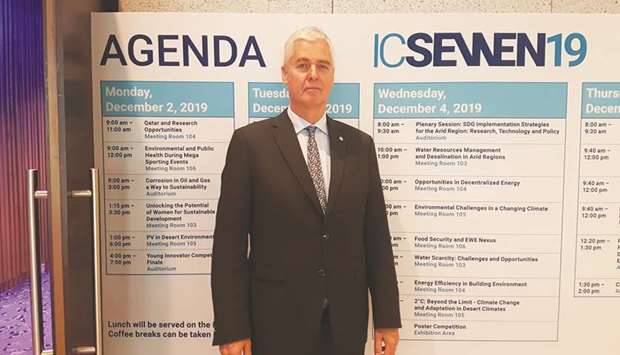The Ministry of Municipality and Environment (MME), in collaboration with Global Green Growth Institute (GGGI), is now preparing to implement its Nationally Determined Contributions (NDCs) as part of its efforts to fight climate change, GGGI director-general Dr Frank Rijsberman has said.
“Qatar will also set up a Measurement, Reporting, and Verification (MRV) system to keep track of emissions and we are looking to work on projects that would indeed help the country become greener, come up with green growth strategy,” he told Gulf Times recently.
GGGI is a Seoul-based intergovernmental organisation with 36 member countries dedicated to promoting green growth and climate resilience. Qatar is a founding member who set up the institution, along with 16 other countries.
Dr Rijsberman noted that they organised a number of activities with MME early this year and prepared a work programme on implementing the NDC.
Once approved by MME and an agreement has been signed, he said they will start implementing the programme in the next three years.
“I was in Mongolia two weeks ago where the government just approved new NDCs with our support, so they are one of the first countries who will be ready. In Qatar, we hope to work the coming year on having these new, more ambitious NDCs with many countries still struggling with how ambitious they can make them,” Dr Rijsberman said.
About what has been achieved so far in the fight against climate change, he said the fact that there was a Paris agreement was a big achievement where “countries coming together at a time, including the US and China, that was pretty significant, because China and India had never come in there.”
“That we have a Paris agreement is somewhat miraculous, the fact that we were able to agree on a rule book last year, few people have expected, now if we can also set up a carbon market which is this year’s big deal, then we move on to the next big target,” Dr Rijsberman pointed out.
“Having higher ambition because in terms of actual emissions we are not doing so well, we are not achieving the real reductions we need to see on a global scale,” he stressed. “Instead, we are seeing forest fires, more typhoons, more droughts, so the warnings keep piling up.”
“We are not making enough progress to address it so countries around the world are feeling the pinch, are feeling the impact of climate change. We need to step up the game, we need to have much stronger, more ambitious NDCs for next year, so that is really what we are aiming for,” Dr Rijsberman said.
About climate finance, he noted that such effort “is a small but important part of the puzzle”.
He explained that the $100bn pledge annually from developed countries to help deal with climate change (both to reduce their own emissions and to adopt to climate change) is a small amount of money.
“If you look at how much money is needed, it’s going to be trillions of dollars to come up, to invest in sustainable infrastructures,” Dr Rijsberman said.
“So the billions that we have in climate finance like the $10bn that Green Climate Fund just received in its replenishment need to be used wisely so we come up with sort of, yes you can have grants and give a $100mn dollar for climate fund to something smart,” he added.
“But smarter is to come with a solution where that support from Green Climate Fund brings additional investments from national domestic investments, banks and pension funds,” Dr Rijsberman said.
At the United Nations General Assembly in New York, he cited Denmark’s announcement of what he described as “a very ambitious target for reducing emissions, they did so with business as a partner.”
“The Danish pension funds have already invested some $15bn in renewable energy in mostly at home in Denmark and they announce there that by 2030, in the next 10 years, they aim to invest another 50bn dollars in this green agenda.”
“The amount of money that are available in the private sector are much larger than what is there in climate finance but climate finance can draw in, can set the credit guarantees, can be that little trench of money that can make a project commercially attractive,” Dr Rijsberman stressed.

Dr Frank Rijsberman

